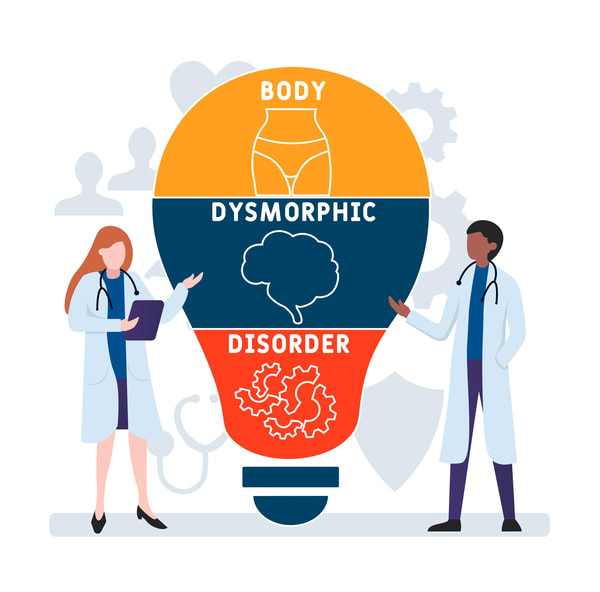
Body Dysmorphia
Friday 9th June 2023
Lee Pedlar
What is body dysmorphia
Body Dysmorphia Explanation
Body dysmorphia, also known as body dysmorphic disorder (BDD), is a mental health condition characterized by a persistent preoccupation with perceived flaws in one's appearance. Individuals with body dysmorphia often have an excessive and irrational concern about minor or non-existent flaws, which can significantly impact their daily functioning, self-esteem, and overall quality of life.
People with body dysmorphia typically focus on specific aspects of their appearance, such as their skin, hair, nose, weight, or body shape. They may spend excessive amounts of time checking and comparing their perceived flaws, seeking reassurance from others, or engaging in behaviours to try to conceal or alter their appearance.
Despite often appearing normal or even attractive to others, individuals with body dysmorphia have a distorted perception of their physical appearance. They tend to magnify the significance of their perceived flaws and may engage in compulsive behaviours like excessive grooming, skin picking, or seeking cosmetic procedures in an attempt to alleviate their distress.
Body dysmorphia can cause significant emotional distress, leading to social isolation, anxiety, depression, and even suicidal thoughts. It is important to note that body dysmorphia is not simply a matter of low self-esteem or vanity but rather a complex mental health condition that requires professional diagnosis and treatment.
Treatment for body dysmorphia typically involves a combination of psychotherapy, such as cognitive-behavioural therapy (CBT), and medication, such as selective serotonin reuptake inhibitors (SSRIs). Therapy aims to help individuals challenge their distorted beliefs about their appearance, develop healthier coping strategies, and improve overall well-being.
Signs of body dysmorphia, or body dysmorphic disorder (BDD)
This can vary from person to person. However, some common signs and symptoms of BDD include:
Preoccupation with perceived flaws Constantly thinking about one or more perceived flaws in appearance that are not noticeable to others or are minimal in appearance.
Mirror checking or excessive grooming Frequently checking one's appearance in mirrors or other reflective surfaces, or spending excessive time on trying to fix or hide perceived flaws.
Avoidance behaviours: Avoiding social situations, relationships, or activities due to concerns about appearance or fear of judgment from others.
Comparing with others Constantly comparing one's appearance to others, often feeling inferior or excessively focused on specific features that are perceived as flawed.
Seeking reassurance Seeking excessive reassurance from others about one's appearance or perceived flaws, often not feeling satisfied even after receiving reassurance.
Excessive self-consciousness Feeling extremely self-conscious and distressed about one's appearance, leading to heightened anxiety or discomfort in social interactions.
Camouflaging or concealing behaviours Engaging in repetitive behaviours to hide or conceal perceived flaws, such as excessive makeup application, wearing oversized clothing, or avoiding certain hairstyles.
Impact on daily life Significant interference with daily functioning, relationships, work or school performance, and overall quality of life due to preoccupation with appearance.Emotional distress: Experiencing significant emotional distress, including depression, anxiety, frustration, or irritability related to body image concerns.
Avoidance of photographs Avoiding being photographed or becoming excessively distressed by photographs due to concerns about appearance.It's important to note that the presence of these signs and symptoms alone does not necessarily mean a person has body dysmorphia.
A professional mental health evaluation is necessary for an accurate diagnosis. If you or someone you know is experiencing distress related to body image, it's recommended to seek help from a mental health professional. due to preoccupation with appearance.
Where to get help in the UK for body dysmorphia
If you or someone you know in the UK is seeking help for body dysmorphia, there are several resources and options available. Here are a few places you can consider reaching out to:
General Practitioner (GP): Start by making an appointment with your GP. They can provide an initial assessment, offer support, and refer you to appropriate mental health services or specialists.
National Health Service (NHS): The NHS provides mental health services across the UK. You can access mental health support through the Improving Access to Psychological Therapies (IAPT) program. Visit the NHS website or speak to your GP to find out about local services and referral options.
Mental Health Charities: There are various mental health charities in the UK that offer information, support, and resources for individuals with body dysmorphia. Examples include Mind (www.mind.org.uk) and Beat (www.beateatingdisorders.org.uk). They may have helplines, online communities, and local support groups.
Specialist Clinics and Hospitals: Some specialized clinics and hospitals in the UK focus on treating body dysmorphia and related conditions. Examples include the Maudsley Hospital in London, which has an established Body Dysmorphic Disorder Service.
Private Therapy: If you prefer to seek private therapy, you can consider finding a qualified therapist or psychologist who specializes in body dysmorphia. Websites like the British Association for Counselling and Psychotherapy (BACP) and the British Psychological Society (BPS) have directories to help you find registered professionals.
Remember, the availability of services may vary depending on your location. It's essential to reach out to professionals or organizations in your area to get accurate and up-to-date information about the support options available to you.




